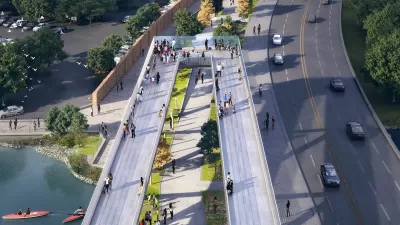Financial literacy is a cornerstone for equitable urban development. Empowering residents with financial knowledge can lead to more sustainable and inclusive economic growth in urban communities.

Financial literacy refers to understanding and effectively using various financial skills, including personal financial management, budgeting and investing. Financial literacy is crucial for enabling individuals to make informed decisions. It enhances their economic stability and contributes to broader economic growth in urban settings where economic activities are concentrated and diverse.
Equitable urban development aims to ensure all city residents have access to the resources and opportunities necessary to thrive regardless of their economic status. Fostering financial literacy allows urban planners and policymakers to empower communities, reduce economic disparities and promote more inclusive growth. It ensures all societal segments widely share the benefits of urban development.
The role of financial literacy in urban development
Financial literacy equips individuals with crucial knowledge and enables them to make informed financial decisions, a skill that only 57 percent of U.S. adults possess. This foundational understanding aids in effectively allocating personal and family resources. It drives better investments in housing and local businesses, which are pivotal for stimulating economic growth.
In communities with higher financial literacy rates, there is a notable efficiency in managing personal and communal resources. This leads to more sustainable development, as financially educated individuals and groups prioritize long-term financial stability and growth. It fosters a robust economic environment that benefits the entire community.
Financial literacy as a tool for equitable development
Disparities in financial knowledge are significant across different urban populations, often reflecting broader socioeconomic inequalities. Improving financial literacy can bridge these gaps by promoting more equitable resource distribution, as understanding what you pay for each month is fundamental to achieving financial awareness. Urban planners can play a pivotal role in this enhancement by integrating financial education into community development projects.
Strategies include the following:
- Partnering with local financial institutions to offer workshops
- Incorporating financial literacy into school curricula
- Using digital platforms to provide accessible, engaging financial education resources
These efforts improve individual financial skills and empower entire communities, leading to more balanced and inclusive urban growth.
Implementing financial literacy initiatives
Urban planners can effectively integrate financial literacy into urban development strategies by collaborating with local educational institutions, economic organizations, and community groups to create and deliver comprehensive education programs. Securing partnerships with local banks and nonprofit organizations can provide expertise and funding to enhance the scope and impact of these initiatives.
However, challenges such as low engagement levels and the complexity of financial topics may arise. Planners must focus on tailoring content to meet the specific needs of different community groups, using relatable examples and interactive tools to increase participation and comprehension. Further, leveraging technology — like mobile apps and online courses — can ensure broader access and continual learning.
How technology affects financial literacy in urban areas
Digital tools and platforms enhance financial education and access to financial services. For instance, virtual payments have become necessary in the wake of the e-commerce boom, growing by $263 billion between 2019 and 2020. These technologies are vital conduits for delivering personalized financial information and resources to diverse urban populations. They ensure financial services are accessible and tailored to individual needs.
Moreover, by using data analytics, financial tech companies can offer customized advice and solutions to make it easier for individuals to understand and manage their finances effectively. Mobile apps, online courses, and interactive financial planning tools can also reach a broader audience. They overcome traditional barriers to financial literacy and enable real-time, practical financial management essential for urban dwellers in the modern economy.
Long-term impact of financial literacy on urban resilience
A financially literate population is better equipped to navigate economic downturns and emergencies, as informed financial decisions help individuals and communities build resilience and stability. Over the last 50 years, the highest-earning 20 percent of U.S. households contributed to about 52 percent of the country’s income, underscoring the importance of financial literacy in addressing economic inequalities.
Integrating financial education into sustainable urban planning allows cities to empower their residents with the skills to manage financial challenges effectively, ultimately reducing economic disparities. This approach fosters individual preparedness, cultivates community-wide resilience, and ensures urban environments can thrive economically over the long term.
Empowering communities through financial literacy
Financial literacy is fundamental to equitable urban development. It is crucial for empowering residents with the skills to achieve economic stability and growth. Urban planners must proactively incorporate financial education into their strategies and ensure communities can meet and overcome the economic challenges of the future.

Planetizen Federal Action Tracker
A weekly monitor of how Trump’s orders and actions are impacting planners and planning in America.

San Francisco's School District Spent $105M To Build Affordable Housing for Teachers — And That's Just the Beginning
SFUSD joins a growing list of school districts using their land holdings to address housing affordability challenges faced by their own employees.

The Tiny, Adorable $7,000 Car Turning Japan Onto EVs
The single seat Mibot charges from a regular plug as quickly as an iPad, and is about half the price of an average EV.

Seattle's Plan for Adopting Driverless Cars
Equity, safety, accessibility and affordability are front of mind as the city prepares for robotaxis and other autonomous vehicles.

As Trump Phases Out FEMA, Is It Time to Flee the Floodplains?
With less federal funding available for disaster relief efforts, the need to relocate at-risk communities is more urgent than ever.

With Protected Lanes, 460% More People Commute by Bike
For those needing more ammo, more data proving what we already knew is here.
Urban Design for Planners 1: Software Tools
This six-course series explores essential urban design concepts using open source software and equips planners with the tools they need to participate fully in the urban design process.
Planning for Universal Design
Learn the tools for implementing Universal Design in planning regulations.
Smith Gee Studio
City of Charlotte
City of Camden Redevelopment Agency
City of Astoria
Transportation Research & Education Center (TREC) at Portland State University
US High Speed Rail Association
City of Camden Redevelopment Agency
Municipality of Princeton (NJ)






























